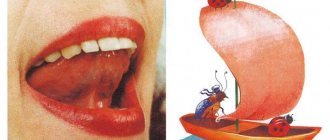Echolalia is the automatic repetition of other people's words, phrases, sentences, and even large parts of texts in speech.
In the process of individual development, there is a stage when echolalia in children is the norm - up to 2 years. At this age, the child actively imitates the behavior of adults (this is a mechanism of healthy mental development). From 6 to 9 months, one can also distinguish a period of normal autoecholalia - this is the time when the child himself repeats babbling syllables (ba-ba-ba, ma-ma-ma). Often parents mistake these autoecholalia for the first words.
If echolalia persists after 2-2.5 years, it is a symptom of a developmental disorder. And there is a stereotype that echolalia is a symptom of autism. This is wrong.
Echolalia can occur with various disorders (and even in adults, by the way):
- ZRR, ZPRR;
- Sensory alalia (dysphasia);
- Mental retardation;
- Schizophrenia;
- Autism spectrum disorder;
- Tourette's syndrome.
Echolalia occurs:
- Immediate
- Deferred.
Often, a child with delayed echolalia can perfectly insert phrases from cartoons and songs into the context of the situation. Good mechanical memory may be a kind of compensatory mechanism.
For me, as a specialist, a diagnosis is always of a secondary nature (especially since I do not make them; sometimes a diagnosis is a tribute to one or another administrative requirements of the system). It is much more important to understand the mechanism of the disorder, find out what and where “broke” and how the brain tries to get around it.
Echolalia and its varieties
Echolalia in children's speech manifests itself in the automatic pronunciation of what is heard without awareness of its meaning.
The child can repeat what an adult nearby or a radio (television) announcer said. The echo symptom can be immediate or delayed. The first type implies that the baby says the phrase as soon as he hears it.
With delayed echo symptoms, children repeat what they heard yesterday, last week or a month ago. This type of symptom is often demonstrated by patients with autism spectrum disorder (ASD). Many autistic people have excellent memories. This allows children to reproduce even short stories almost unchanged. Autistic people are able to repeat text, even if they heard it a long time ago.
Echolalia in a 4-5 year old child is often accompanied by other problems. For example, these could be delays in speech or psychospeech development (SRD or ZPR), alalia, and even mental illness. Due to the fact that repetition of words can be a sign of a serious disorder, it is necessary to seek help from the NeuroSpectrum Center for Pediatric Speech Neurology and Rehabilitation.
Correction for echolalia
- Correction, of course, must be tailored individually depending on the mechanism of the violation.
- Tomatis is indicated for slow processing of auditory information (this disorder can often be seen using evoked potential testing);
- You can use visual and kinesthetic supports (pictures, objects) to help your child;
- If there is a violation of thinking, correlation of words and objects, planning a statement, games with checklists, solving “problem” situations (which provoke a departure from the comfort zone and activation of initiative, but feasible for the child), visual-rhythmic tasks, as well as special aids for development of thinking (for example, Strebeleva’s manual).
Neuropsychologist Alexandrova O.A.
To make an appointment with a neuropsychologist, call or fill out the form on the website.
Why do speech repetitions occur?
It is impossible to say that repetitions found in children's speech are meaningless. The fact is that until a certain age, this manner is the norm. But its presence in the speech of older children is already a sign of pathology. Echolalia in a child aged 3 years is an opportunity:
- Keep the conversation going. The baby is still too young to understand that conversation involves dialogue. He is unable to formulate a sentence and is confident that for successful communication one just needs to repeat after the interlocutor.
- Understand what you hear. This manner is typical for adults learning a foreign language. To understand a phrase, they need to feel it, and repetition helps with this, including for babies.
- Identify an object or action. For example, if a baby was told “Let’s go eat!” before feeding, he will subsequently repeat this phrase if he wants to be fed. Therefore, speech therapists recommend initially, when performing certain actions, to accustom them to the phrase that in this situation should be uttered by a child, and not an adult. For example, when giving a toy to a child, say “Give!” Although usually, and this is logical, they say “Here!” If you adhere to this tactic, then later, when the child learns to speak, if the baby needs a toy, he will immediately say “Give it!”;
- Express your consent. In this case, repetition of the phrase may mean that the child does not object to what was said.
- Show your emotions. Then the children say phrases that they associate with certain feelings.
If echolalia in the speech of an older child is needed for self-stimulation or restoration of internal balance, ASD may be suspected. Rituals and habits are important for autistic people. Repeating a certain phrase helps them move into the desired state: calm down or become more active.
Causes of the disease
Imitating heard words is a normal development of a baby's speech skills, but when this state of affairs continues in the child's life, it usually indicates a disinhibition of the imitative reflex. Also, symptoms that do not go away with age may indicate possible damage to the left hemisphere of the brain.
However, signs of the disease often indicate various mental illnesses, including Pick's disease , Tourette's syndrome, and catatonic schizophrenia . In most cases, people with autism tend to repeat words without realizing it.
Diagnostics and correction
Symptoms of echolalia in children under the age of 1 year and at 3–4 years, that is, during periods when speech is being formed especially actively, do not need correction. This is a variant of the norm, a way of mastering one’s native language. If, in addition to repetitions, there are other signs of deviations, it is advisable to show the child to a psychologist or neuropsychiatrist.
If echolalia is diagnosed in a 5-year-old child, it is necessary to visit a speech pathologist and begin working with a specialist. It is advisable to create special conditions at home taking into account the diagnosis:
- Monitor your speech, pronounce words clearly and competently.
- Compose questions so that only “yes” or “no” can be answered, eliminating the possibility of double interpretation.
- Try to provide a calm environment at home. We are talking not only about negative manifestations of emotions (about scandals, swearing), but also about too bright positive feelings.
- Accustom yourself to speaking to your child in an even, calm tone. Often, with repeated repetitions, if it is necessary to explain something, the understanding of which causes difficulties for the learner, people unconsciously switch to a raised tone, begin to gesticulate, and move actively. This is additional stress for all family members, and it is also a problem for the child, because he associates certain speech structures with specific feelings. Subsequently, the baby will begin to use these phrases in communication to express his own emotions.
Echolalia itself does not require treatment with medication. A speech therapist expands vocabulary, teaches children to express thoughts correctly and have conversations. However, it is equally important to clarify the root cause of the echo symptom, that is, the main diagnosis, and at the same time deal with this problem.
Our Center’s specialists diagnose and correct echolalia in children of any age. They will help both determine the main diagnosis and select a competent treatment regimen.
Mechanisms of echolalia:
- Impaired/slowed processing of auditory, auditory-speech information (more often with immediate echolalia);
- Violation of the cognitive mechanisms of speech (correlating a word with the object/action it denotes, and grammatical connectives);
- Lack of formation of the image of “I” as a subject of speech (problems with the use of pronouns can often be observed in children with echolalia) and corresponding communication problems;
- Violation/immaturity of the function of planning a speech utterance (articulation remains intact, but what to say and in what order is a problem);
- Impaired/immature thinking;
- Violation of “central binding” - the ability to analyze and connect details into a big picture (this can also be attributed to thinking).
I can list for a long time the areas of the brain that may be “guilty” of echolalia, but the meaning is the same: there is no single localization. It is possible with conductors (white matter), the left frontal lobe, the posterior association cortex and the lateralization of speech function.
Another stereotype associated with echolalia: you need to get rid of them urgently, they are bad. Yes, echolalia is a symptom of an existing brain disorder. But echolalia is most often a functionally good sign; you can work with it and develop it.
Potential risk of hysteria
It's a fairly common scenario in the autism community where the cause of a tantrum is a misunderstanding due to immediate echolalia. An adult asks a child: “Do you want grapes or apples?” The answer is almost always the last word: “Apples.” The adult decides that the child really wants apples. The child then begins to scream wildly when he is given an apple, because the child answered before he even realized the two options offered, and in fact he wanted grapes. Picture cards or PECS are a great way to offer your child options or prepare them for change, which can help prevent tantrums.
Summing up the day
Delayed echolalia may also be a way to process memories that are haunting you. My son used to come home from kindergarten and repeat phrases and sentences he heard throughout the day: the good, the bad and the ugly.
He especially liked to repeat the teacher's words to children who misbehaved, he even perfectly conveyed the teacher's intonation: “Kevin, we don't go barefoot at school,” “Joey, we touch gently,” “Tommy, we don't put our hands in toilet. This is not a waterfall."
I felt like I was receiving daily radio news from a kindergarten. My son communicated with me, telling me that the school was a loving and supportive environment and that he liked his teachers and classmates. And that’s why, as I said earlier, delayed echolalia is a mother’s best friend.
Communication and speech
Causes and symptoms of the disease
Some pathological conditions, mental, and neurological diseases cause speech anomalies. Sometimes (as in autism), seemingly negative symptoms even serve as an indicator that the functions of echolalia are present.
The causes of the disease are:
- damage to a certain part of the brain (frontal lobe);
- neurological and mental pathologies;
- mental retardation;
- manifestation of autism and schizophrenia;
- Rett syndrome (severe genetic disease) / Tourette;
- imbecility (oligophrenia);
- a brain tumor;
- dyslexia;
- dysphasia.
Determining the underlying disease (as well as the cause of the pathology) is a fundamental point, since echolalia goes away with treatment.
Self-stimulating behavior
Delayed echolalia is sometimes a self-stimulating behavior whose sole purpose is the pleasure of the speaker. My eldest son always likes to repeat sentences he read in books. I realized that he sees the book in his head, and simply entertains himself by “rereading” his favorite passages over and over again. The line "George, what's that smell?" clearly borrowed from the book about the skunk "Curious George", which invariably causes homeric laughter.
He also enjoys repeating clips from his favorite videos as if he were watching them in his head. When delayed echolalia is used as personal entertainment, it can interfere with real communication. An adult can use such echolalia as a hint to gently switch the child to a more constructive activity.
Treatment of echolalia in children and adults in Saratov
Sarklinik (Russia, Saratov) successfully uses hardware and non-hardware methods for treating echolalia in children, adolescents and adults in Saratov. Treatment is carried out on an outpatient basis in courses. The minimum duration of one course of treatment is 10 working days. The total number of courses depends on the severity of the pathology. Sarklinik knows how to treat echolalia in boys and girls, how to get rid of echolalia in boys and girls, what to do with echolalia in men and women.
Sarklinik also provides treatment for delayed speech development, treatment for delayed psycho-speech development, general speech underdevelopment (GSD), treatment for mental retardation, mental retardation, treatment of alalia, dyslalia, and autism in children.
Sign up for consultation There are contraindications. Specialist consultation is required.
When using article materials, an active link to sarclinic.ru is required. Text: ® SARCLINIC | Sarclinic.com \ Sarсlinic.ru Photo: © davetroesh / Photobank Photogenica / photogenica.ru The people depicted in the photo are models, do not suffer from the diseases described and/or all coincidences are excluded.
Related posts:
General speech underdevelopment in children, phonemic onset: levels, correction, treatment
Akataphasia, treatment of akataphasia in Saratov
Cerebral palsy in children, children with cerebral palsy, treatment
Alalia for children, alalia treatment, motor, sensory, sensorimotor
Psychopathy, types, symptoms, treatment of psychopathy in children and adolescents







